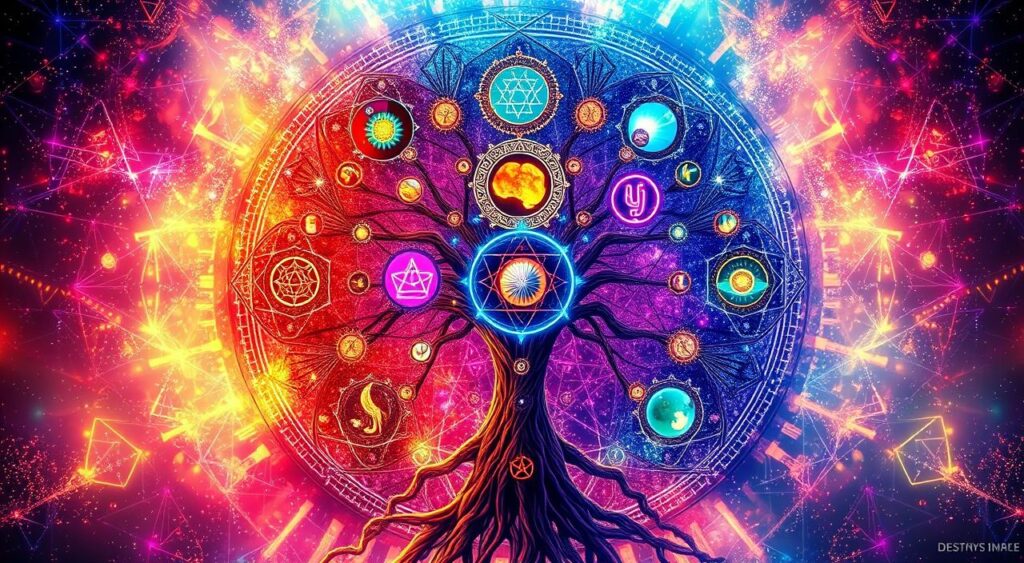Exploring the History of Numerology Through Time

Exploring the History of Numerology Through Time
When exploring the history of numerology through time,Have you ever thought about why numbers are so important in our lives? The world of numerology might have the answers. Let’s begin exploring the history of numerology through time together. We’ll see how it started in ancient times and how it has changed over the years.
From the mysteries of old civilizations to today’s spiritual practices, numerology has always been intriguing. It gives us insights into our lives and the universe.
The Language of Numbers
Numerology is a field that explores the spiritual meanings of numbers. It has been fascinating people for centuries. It offers insights into our personalities, life paths, and existence.
What Is Numerology?
Numerology believes numbers have deep spiritual meanings. It helps us understand ourselves and the world. By looking at our names and birth dates, numerologists find our unique energy blueprint.
The Essence of Numbers
Each number from 0 to 9 has its own qualities and vibrations. The numerology meanings help us understand the numbers in numerology. This way, we can grasp our numerology principles and numerology definition better.
Numerology is a powerful tool for self-discovery and growth. It helps us see the universal patterns in our lives. Whether you’re new or experienced, the numerology meanings and numbers in numerology can change how we see ourselves and the world.
“Numerology is the study of the numerical value of things. It is the belief that the universe is a mathematical construct, and that numbers hold the key to understanding the nature of things.”
Ancient Origins: Tracing the Roots
Numerology’s history goes back thousands of years. It started in ancient places like Babylon, Egypt, and China. These cultures saw numbers as very important, using them in their spiritual and cultural lives.
Babylonian Numerology
In Babylon, numbers were thought to be special, linked to the stars. Priests used numbers to predict the future and make big decisions. They saw each number as a sign from the heavens.
Egyptian Numerology
In ancient Egypt, numbers were magical and connected to the soul. Priests used them to help people grow spiritually and build sacred places. They believed numbers greatly affected our lives.
Chinese Numerology
Chinese numerology is about finding balance and harmony in numbers. They linked numbers to Yin and Yang, showing how they influence our destiny. This idea has shaped many parts of Chinese culture, from names to architecture.
These ancient cultures each brought their own view of numbers. Together, they created the rich history of numerology. Their ideas still shape how we see numbers today.
Pythagoras: The Father of Modern Numerology
Pythagoras, an ancient Greek philosopher, is known as the father of modern numerology. He was born around 570 BCE on Samos. Pythagoras spent his life studying numbers and their mystical meaning. He thought numbers were the essence of creation, showing the world’s beauty and order.
Pythagoras started a school to teach numerology. He taught about the soul’s reincarnation and the meaning of numbers. His ideas influenced famous Greek philosophers like Plato. They shaped numerology in the Roman era and later.
Pythagoras believed numbers connected us to the universe. He found that numbers created music harmony and linked planets. He linked numbers with spiritual meanings, like:
- The number 1 representing unity
- The number 2 symbolizing the female principle
- The number 3 representing the male principle
- The number 4 as a symbol of justice and order in the universe
- The number 5 as a representation of human life and marriage
Pythagorean numerology grew to explore the soul, cosmos, and material and spiritual worlds. This ancient philosophy deeply influenced modern numerology and remains popular today.
“Numbers rule the universe. Everything is number. Everything in the cosmos is determined by number and order.” – Pythagoras
Numerology in Ancient Rome and Early Christianity
Numerology has been key in many cultures and beliefs. In ancient Rome and early Christianity, it was especially important. The use of gematria, or the study of numbers in words and names, shaped their spiritual and cultural lives.
In ancient Rome, letters were given numbers to find hidden meanings. For example, Nero’s name was compared to “murdered his own mother.” This way of using numbers was popular among the Roman elite.
Gematria: The Art of Numerical Interpretations
Early Christianity also valued numerology, with both Gnostic and Catholic traditions using gematria. Figures like Augustine organized their writings by numbers. The Neoplatonists, such as Plotinus and Hypatia, also used numerology in their views of the universe.
The Bible uses numbers like three and a half, seven, and twelve to share deeper meanings. These numbers were used to reveal spiritual truths.
“Numerology became an integral part of the cultural and spiritual fabric of these ancient societies.”
Numerology’s role in ancient Rome and early Christianity shows our ongoing interest in numbers. As we delve into history, the connection between numerology in ancient Rome, numerology in early Christianity, gematria, and numerical interpretations remains fascinating.

the history of numerology
Numerology’s history spans centuries, spreading across regions and merging with spiritual traditions. After the Western Roman Empire fell, Pythagorean teachings moved to Byzantium and then the Islamic world. There, mystic groups like the Brethren of Purity expanded on these teachings.
In the Middle Ages and Renaissance, numerology attracted magicians and occultists. Scholars like Heinrich Agrippa von Nettesheim kept Pythagoras’ work alive. They added to it, making numerology more complex.
The New Thought Movement of the late 19th and early 20th centuries boosted numerology’s popularity. It became a tool for self-discovery and spiritual growth. Today, it’s a thriving practice, helping people understand themselves and the universe.
The Spread of Numerology
- After the fall of the Western Roman Empire, Pythagorean teachings found a new home in Byzantium and the Islamic world.
- Numerology became closely intertwined with the Kabbalah, with Kabbalists using gematria to uncover hidden meanings in the Old Testament.
- During the Middle Ages and Renaissance, numerology was embraced by magicians and occultists, with scholars like Heinrich Agrippa von Nettesheim preserving and expanding on the work of Pythagoras.
- The New Thought Movement of the late 19th and early 20th centuries played a significant role in popularizing numerology as a tool for self-discovery and spiritual growth.
Integration into Spiritual Traditions
Numerology has been part of many spiritual traditions worldwide. It’s used in the Kabbalah and the I Ching, among others. These traditions see numerology as a way to understand the divine and the universe.
| Spiritual Tradition | Integration of Numerology |
|---|---|
| Kabbalah | Kabbalists used the art of gematria to uncover hidden meanings in the Old Testament. |
| I Ching | The I Ching, a widely practiced system of numerology in the Far East, is based on the interplay of the yin and yang forces represented by the hexagrams. |
| Pythagorean Brotherhood | Pythagoreans combined religious ritual with scientific study, including numerology teachings, in their philosophical and spiritual practices. |
“Numerology, like astrology, uses birth dates to ascertain a person’s personality traits. Each numerical Life Path and Destiny Number corresponds to unique traits and challenges for individuals.”
The Mystical Influence of the Kabbalah
The study of Kabbalah, an ancient Jewish mystical tradition, has greatly influenced numerology. Kabbalists thought that life’s aspects are shown through numbers 1 to 10. Each Hebrew letter has a number and a spiritual idea. They used gematria to find deeper meanings in the Old Testament.
The Kabbalistic Tree of Life is key for understanding numbers. It has ten Sephiroth, or emanations, each linked to numbers and ideas. This gives a rich view of numerology and its connections.
The Tree of Life and Gematria
Numerology in Kabbalah shows the deep spiritual side of numbers. Kabbalists thought that finding the numbers behind words could reveal hidden truths. They saw the divine in sacred texts through numbers.
With gematria, Kabbalists looked at the numbers between words and ideas. They wanted to show how everything is connected. This idea has spread to many spiritual traditions over time.

“The Kabbalah’s profound influence on numerology has left an indelible mark on the way we understand the mystical power of numbers.”
The Kabbalah and its numerology still interest many. It gives a special view on the importance of numbers in our world and lives.
Numerology in the Middle Ages and Renaissance
In the Middle Ages and Renaissance, numerology was a big deal. Magicians, occultists, and scholars all loved it. Heinrich Cornelius Agrippa von Nettesheim was a key figure. He wrote “Three Books of Occult Philosophy,” which helped spread Pythagorean numerology.
Agrippa linked the Latin alphabet to numbers, making a detailed system. This system is still used in numerology today. Other thinkers like Marsilio Ficino and Michael Psellus also worked on Pythagorean numbers.
They helped keep these ideas alive in Western esoteric traditions. Medieval scholars like Calcidio and Macrobio talked a lot about numbers. They focused on arithmetic, geometry, and harmony.
Neoplatonic philosophers like Plotino and Giamblico wrote a lot about numerology. They saw numbers as having deep meanings. The number seven was especially important, linked to movement and human life.
| Significance of Numbers in the Middle Ages and Renaissance |
|---|
| Medieval architects used numbers and geometry in buildings like San Miniato al Monte. This showed how numbers and symbols were used together. |
| The basilica’s design told stories from the Bible. It linked creation to the New Jerusalem through numbers and architecture. |
| The Tractat de prenostication from the late 15th century shows the interest in magic and prediction. It used astro-numerology, combining ancient and Arabic ideas. |
The occult philosophy and numerology of the Middle Ages and Renaissance were very influential. They shaped the esoteric traditions and architectural symbols of the time. This shows how much people were fascinated by the mystical side of numbers.
The New Age Movement and Numerology Today
The New Age movement, which started in the late 20th century, made new age numerology popular. It fit well with the New Age’s mystical and spiritual views. Writers and practitioners spread numerology in popular culture through books, workshops, and online numerology platforms.
Now, numerology is everywhere in media, fashion, and art. Online numerology services and free personalized readings make it easy for people to explore. This meets the modern desire for self-discovery and spiritual growth.
Modern Applications and Accessibility
Numerology is loved for its promise to reveal hidden truths through numbers. About one in three Americans believe in New Age ideas. This is seen in the popularity of numerology and other mystical practices.
“Numerology can be traced back to at least 500 BC with the Greek philosopher Pythagorus discovering the relationship between numbers and music notes.”
The New Age movement started in the late 1960s and early 1970s. It was linked to the hippie counterculture. The Beatles’ interest in Eastern mysticism after their trip to India also helped numerology gain interest.
Today, numerology draws people from all walks of life. New Age followers use it along with meditation, seances, and divination. It’s a way for many to find meaning in numbers and their life’s journey.
Get your free reading here
Key Takeaways
- Numerology has roots dating back thousands of years, with origins in ancient civilizations like Babylon, Egypt, and China.
- The Greek philosopher Pythagoras is widely considered the father of modern numerology, laying the foundations for its development.
- Numerology has been embraced by various spiritual traditions, including early Christianity, the Kabbalah, and the New Age movement.
- Numerology continues to fascinate individuals seeking guidance and insight, reflecting our enduring fascination with the symbolic power of numbers.
- The history of numerology showcases its enduring influence and ability to provide deeper understanding of ourselves and the world around us.
Conclusion
Exploring numerology’s history shows us how it has fascinated people for centuries. It started in ancient places like Babylon, Egypt, and China. Then, Pythagoras in ancient Greece and the Kabbalah added to its mystique.
What makes numerology so appealing? It helps us understand the universe, our destiny, and the secrets in numbers. It guides us in making choices, building relationships, and finding our way in careers. This shows our eternal search for the mysteries of life and our place in it.
Today, numerology remains popular, reminding us of our quest for meaning and connection. Whether you’re new to numerology or have been studying it for years, its history offers a deep look into human experiences. It shows how numbers can influence our lives and our futures.
FAQ
What is the history of numerology?
Numerology has a long and interesting history. It started in ancient places like Babylon, Egypt, and China. Over time, it has grown and changed, showing its lasting power to help us understand life.
What is the essence of numerology?
Numerology believes numbers have special meanings. They help us learn about ourselves, our paths, and our futures. Each number from 0 to 9 is thought to carry its own spiritual message.
What are the ancient roots of numerology?
The first signs of numerology come from old places like Babylon, Egypt, and China. People there thought numbers were special and used them for spiritual growth and understanding the world.
Who is considered the father of modern numerology?
Pythagoras, a Greek thinker, is seen as the start of modern numerology. He thought numbers were the core of everything and studying them could show the world’s beauty and order.
How was numerology integrated into ancient Rome and early Christianity?
In ancient Rome, numbers were used to find hidden meanings, like comparing Nero’s name to “murdered his own mother.” Early Christianity also used numerology, with both Gnostic and Catholic groups practicing it.
How did numerology spread and evolve over the centuries?
After the Western Roman Empire fell, Pythagorean teachings moved to Byzantium and then the Islamic world. There, mystic groups developed them further. Numerology also mixed with the Kabbalah, with Kabbalists using gematria to find hidden meanings in the Old Testament.
What was the role of the Kabbalah in the development of numerology?
The Kabbalah, a Jewish mystic tradition, greatly influenced numerology. Kabbalists saw life as a mix of numbers 1 to 10. Each Hebrew letter and number had a spiritual meaning.
How did numerology evolve during the Middle Ages and Renaissance?
In the Middle Ages and Renaissance, numerology was still popular among magicians, occultists, and scholars. Heinrich Cornelius Agrippa von Nettesheim, a Renaissance scholar, helped keep and grow Pythagorean numerology in his book “Three Books of Occult Philosophy.”
What role did the New Age movement play in the modern popularity of numerology?
The New Age movement, which started in the late 20th century, made numerology popular again. Its mystical and spiritual views fit well with the New Age, making numerology a big part of our culture.



